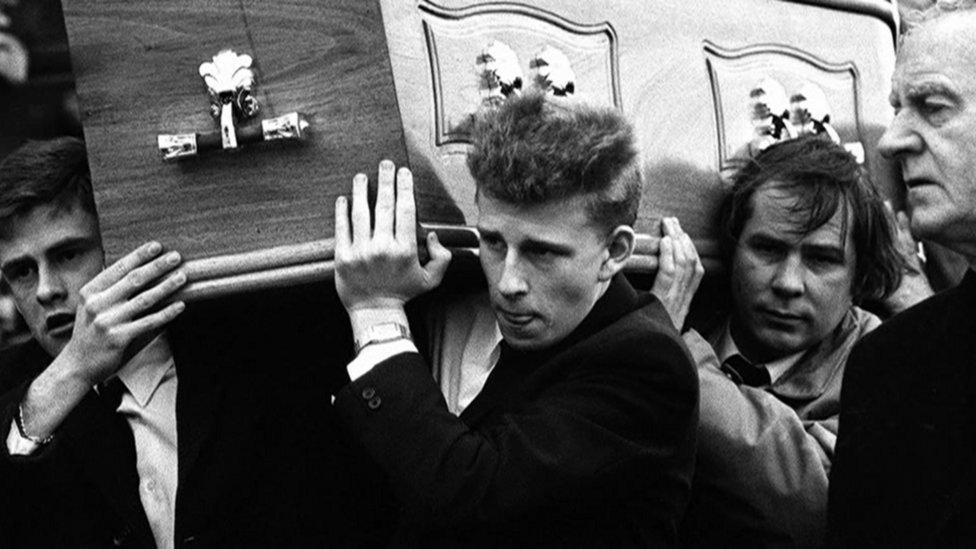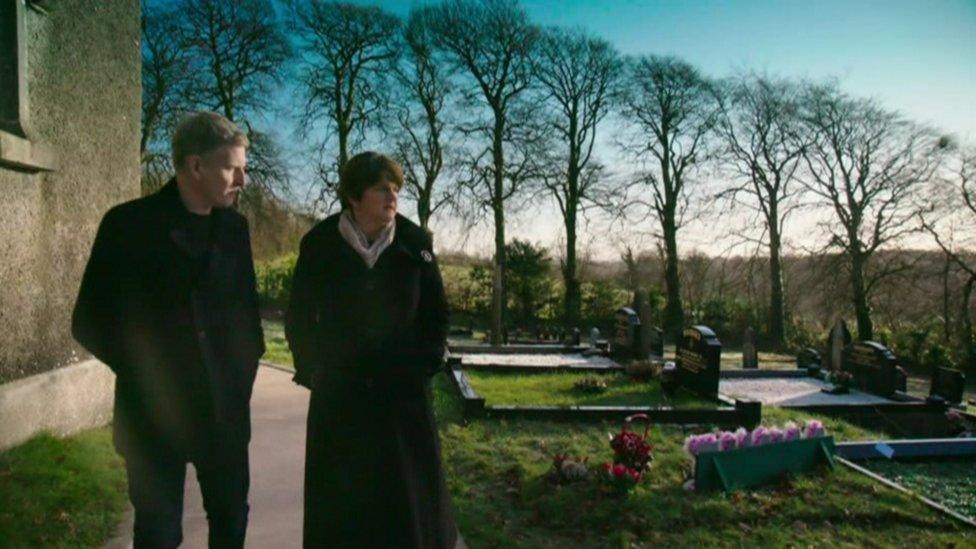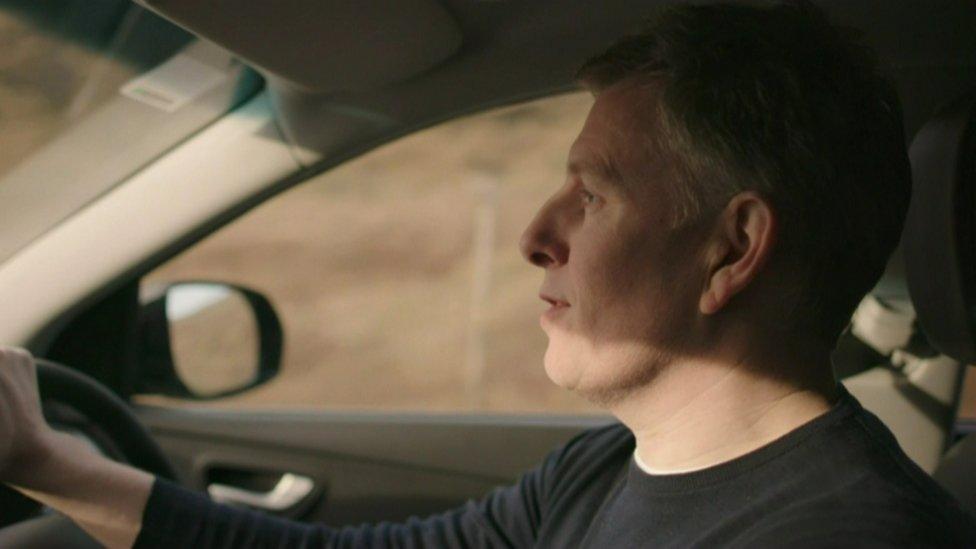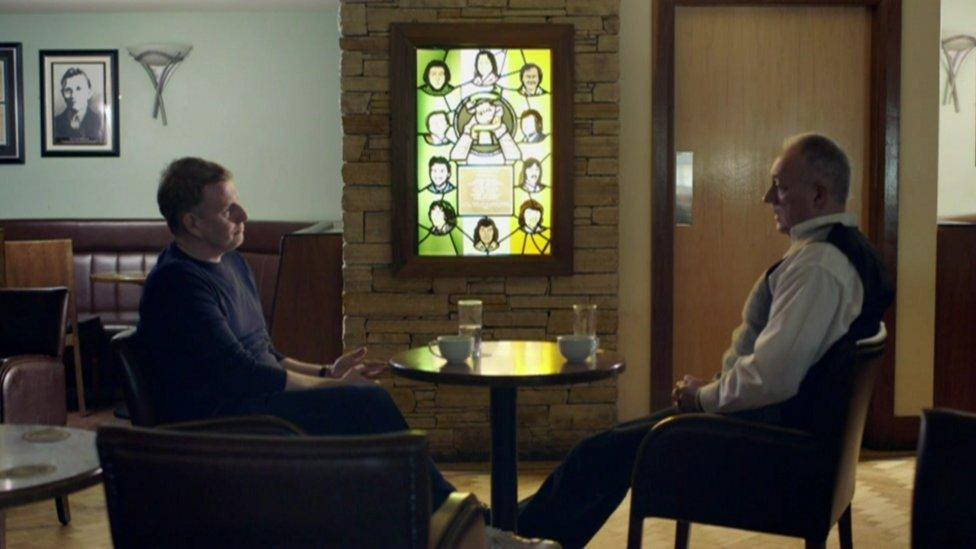Patrick Kielty's family rejected IRA 'revenge' offer
- Published

Patrick Kielty carrying his father's coffin in 1988
Comedian Patrick Kielty has revealed that the IRA offered "revenge" for his father's murder by loyalist paramilitaries in 1988.
Kielty's father Jack was shot dead in 1988 in Dundrum, the County Down town where he grew up.
However, he stressed that his family rejected the IRA's offer "in no uncertain terms".
He makes the claim in a new BBC 1 documentary to be broadcast on Wednesday.
In 'My Dad, the Peace Deal and Me', Kielty recalls how his uncle was approached by members of the IRA at the graveyard.
He says the man said to his uncle: "We could properly use a couple of good smart, strong, strapping lads like those Kielty lads if they are interested in revenge."
Kielty explained that his family were not interested in any form of retaliation: "They were told in no uncertain terms where to go," he said.
Patrick Kielty in 'My Dad, the Peace Deal and Me'
"My dad died for nothing - he wasn't a political figure, he wasn't taking a stand.
"He had a building firm, he employed both sides. That wouldn't be considered a stand anywhere else.
"He was just doing the right thing."
Three men were convicted in connection with the killing, but freed after the Good Friday Agreement in 1998.
In the documentary, Kielty explores the legacy of the agreement 20 years on. He reveals that he voted in favour of it but goes to meet those who did not - like DUP leader Arlene Foster.
Her police officer father was shot by the IRA but survived, while she also survived a bomb attack on her school bus.

Patrick Kielty met Arlene Foster to discuss the legacy of the Good Friday Agreement
She went on to study at Queen's University at the same time as Patrick Kielty, but told him that her opposition to the agreement was due to prisoner releases.
"How can you allow people who have committed some of the most hideous crimes just walk free as if they had done nothing?" she asked.
Kielty told her that he voted 'yes', despite knowing it would lead to the release of the men convicted of his father's murder.
"That's true for you, but for others they want justice," she replied.
"Sadly, there are some people that still want retribution.
"That's why, 20 years later, we're talking of the legacy of the troubles and struggling with how to deal with it."

Patrick Kielty opens up about his experience of the Troubles in 'My Dad, the Peace Deal and Me'
Around 500 prisoners were released after the agreement, over half of them from the IRA.
Patrick Kielty went to the Felons Club in west Belfast to meet one of them, former IRA commander in the Maze prison, Seanna Walsh.
Questioned about the innocent people killed in the troubles, Walsh said that a lot of things happened "which don't sit comfortably with the passing of time".
"Do you mean you regret it?" Kielty asked.

Former IRA commander in the Maze prison, Seanna Walsh, told Kielty he did not regret his part in the Troubles
"I regret the fact that we were at war, but I can't say that I regret what I did, Paddy, to be honest with you," Walsh replied.
"I wouldn't be true to myself if I was saying that I regret what I was involved in, because I'm actually proud of having been involved in the struggle here."
After his interview with Walsh, Kielty asks: "Does Seanna have the answer for the future? I don't think he does."
'No middle ground'
He added: "Seanna is really convinced that there's going to be a united Ireland and that what he believes is going to happen in the future will happen.
"The people on the other side feel exactly the same way, there's no middle ground."
Among the others who feature in the documentary are PUP politician and former UVF prisoner Billy Hutchinson, as well as the founder of the 'Children in the Crossfire' charity, Richard Moore.
He also asks a group of pupils in Shimna Integrated College in Newcastle how they feel about the future of Northern Ireland and returns to meet friends and family in Dundrum.
'My Dad, the Peace Deal and Me' is broadcast on BBC One at 2100 GMT on Wednesday 4 April.